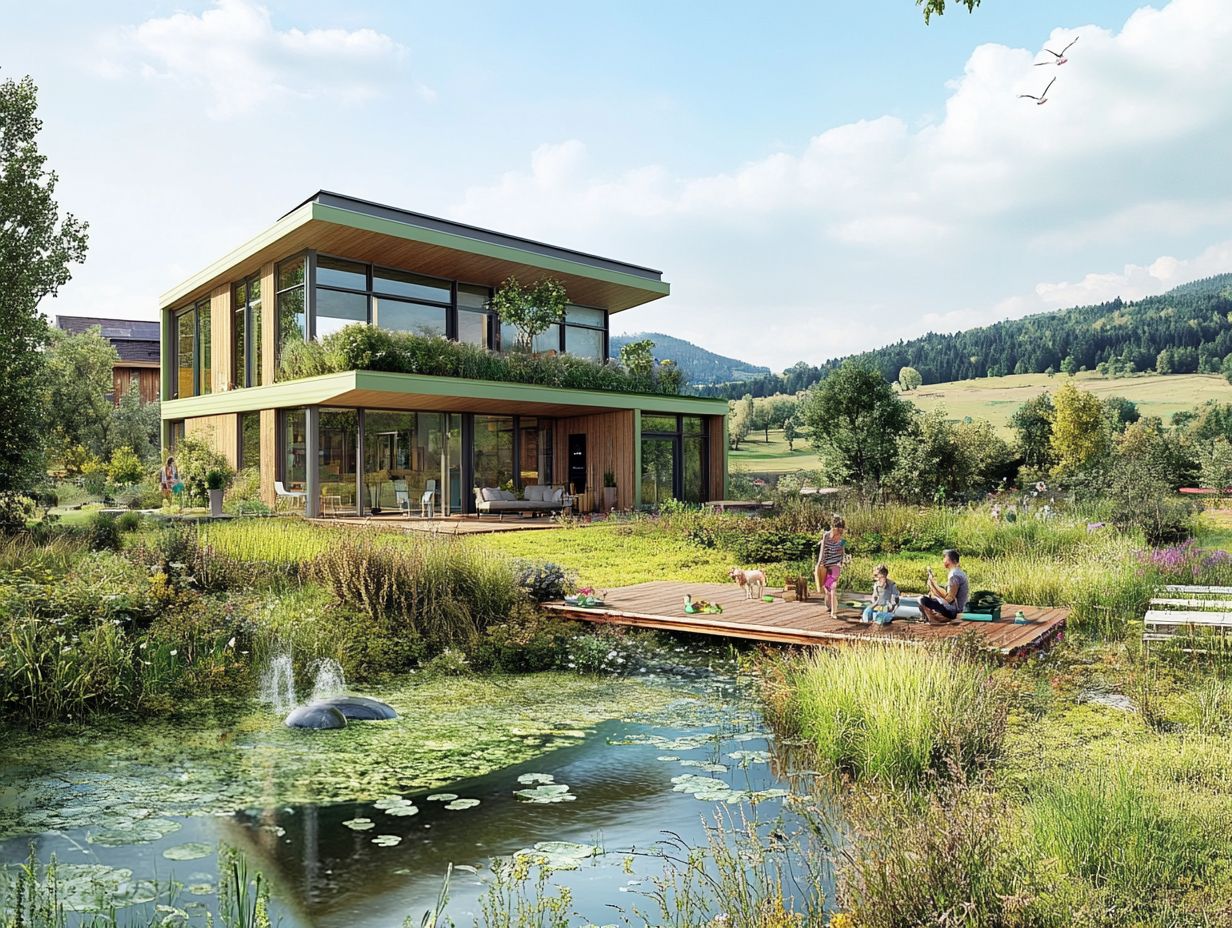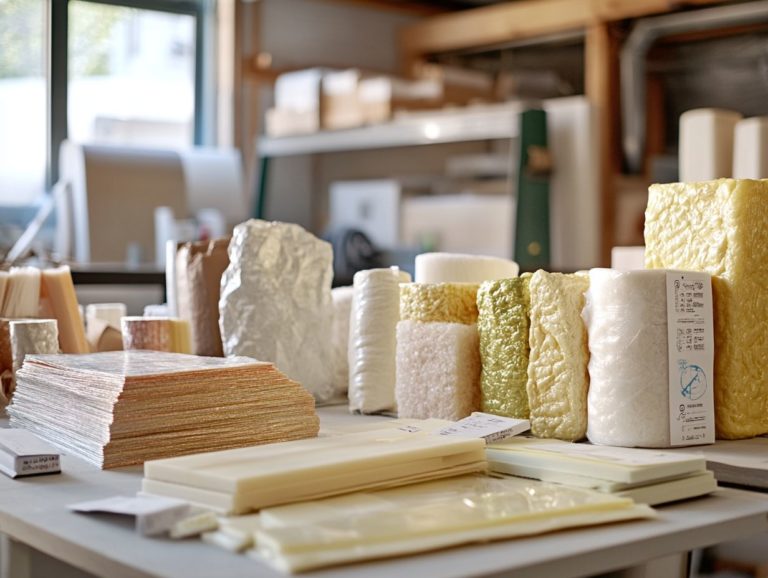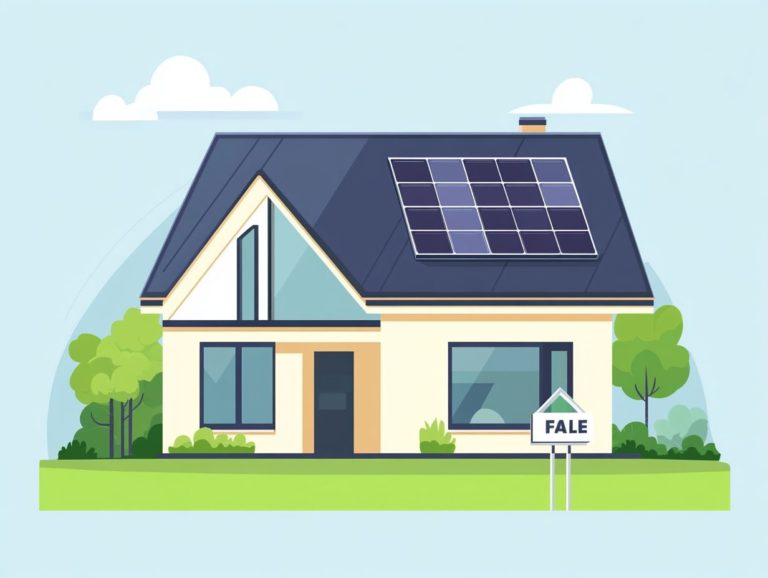What is Geothermal Energy for Homes?
Geothermal energy stands as a remarkable and sustainable resource, tapping into the Earth’s inherent heat to deliver efficient heating and cooling solutions for your home. Let s explore the basics of geothermal energy together.
This exploration highlights its many benefits and the various systems available for residential use. You’ll also gain insight into the installation and maintenance processes, empowering you to assess whether geothermal energy is the perfect match for your living space.
Uncover how this cutting-edge energy source can truly elevate your home experience. Start saving on your energy bills today by considering geothermal energy for your home!
Contents
- Key Takeaways:
- Understanding Geothermal Energy
- Benefits of Geothermal Energy for Homes
- Types of Geothermal Systems for Homes
- Installation and Maintenance of Geothermal Systems
- Is Geothermal Energy Right for Your Home?
- Common Misconceptions about Geothermal Energy
- Frequently Asked Questions
- What is Geothermal Energy for Homes?
- How does Geothermal Energy for Homes work?
- What are the benefits of using Geothermal Energy for Homes?
- Are there different types of Geothermal Energy systems for homes?
- Is Geothermal Energy for Homes expensive to install?
- Can Geothermal Energy for Homes be used in all climates?
Key Takeaways:

- Geothermal energy is a renewable energy source that uses heat from the Earth to power homes.
- It offers significant cost savings and has a minimal environmental impact compared to traditional energy sources.
- There are different types of geothermal systems for homes, including open loop and closed loop systems, and their installation and maintenance should be carefully considered based on individual needs and preferences.
Understanding Geothermal Energy
Geothermal energy represents a cutting-edge and sustainable avenue for renewable energy. It harnesses the Earth s internal heat to offer a dependable solution for heating and cooling systems.
By employing ground loops and heat pumps, geothermal systems tap into the consistent temperature of the ground, delivering exceptional heating and cooling efficiency. This approach not only reduces your heating bills but also dramatically lowers carbon emissions compared to conventional methods like fossil fuels, propane, or oil.
Embracing this remarkably efficient HVAC (Heating, Ventilation, and Air Conditioning) system enhances your energy savings and champions energy efficiency throughout residential properties.
Benefits of Geothermal Energy for Homes
Geothermal energy presents an array of advantages for homeowners, revolutionizing the approach to residential heating and cooling through systems that utilize the Earth’s innate heat.
By opting for geothermal heating solutions, you can experience substantial energy savings on your heating bills while actively participating in the reduction of carbon emissions. This makes your home more environmentally friendly.
The impressive energy efficiency of geothermal systems elevates your comfort and diminishes your dependence on conventional heating sources. This leads to significant long-term financial benefits.
Efficiency and Cost Savings
One of the standout advantages of geothermal energy is its unmatched efficiency, which directly translates into substantial cost savings for you as a homeowner over time. Geothermal systems are engineered to operate at a higher energy efficiency compared to traditional HVAC systems, leading to lower heating bills and maintenance costs.
By tapping into the consistent temperature of the ground, geothermal heating systems offer a cost-effective alternative to fossil fuels and other heating methods. This innovative approach leverages the Earth s stable temperatures, allowing for an impressive 25% to 50% reduction in energy use compared to conventional systems.
For example, a typical geothermal heat pump can generate four units of energy for every unit consumed, demonstrating its remarkable effectiveness. Case studies show that homeowners can save between $1,000 and $2,500 annually on heating and cooling costs, depending on their location and usage.
Geothermal systems often last over 20 years, enhancing their financial appeal when considering them as long-term investments.
Environmental Impact
The impact of geothermal energy on the environment is very positive. It plays a crucial role in the shift toward renewable energy solutions.
By using the Earth s natural heat, geothermal systems significantly cut carbon emissions. This helps combat climate change and protect our environment.
Compared to fossil fuels, geothermal energy is eco-friendly and reduces your ecological footprint.
Adopting geothermal energy also improves air quality. It eliminates harmful pollutants that come from burning fossil fuels.
This clean energy source protects ecosystems and helps local wildlife thrive.
Geothermal heating is sustainable and ensures a stable energy supply. It supports ecological balance and resource conservation.
With its wide-ranging benefits, geothermal energy is vital in the global drive for sustainable living.
Types of Geothermal Systems for Homes

You ll find various geothermal systems for homes. Each is designed to meet specific needs and adapt to different environments.
The two main types are open loop and closed loop systems. Both use ground loops and heat pumps to transfer thermal energy efficiently.
Open-loop systems draw water from a well or surface water. Closed-loop systems circulate fluid through pipes buried underground.
These options allow you to harness geothermal energy and increase your home s efficiency.
Open Loop vs. Closed Loop Systems
Open loop and closed loop systems are the two main types of geothermal systems. Each has unique advantages for homeowners.
Understanding how each system works is crucial for your decision. Open loop systems take water from a well or surface body for heat exchange, then return it to the environment.
This approach can cut installation costs, especially in areas with abundant water resources.
Closed loop systems have higher upfront costs due to extensive underground piping. However, they offer great longevity and lower maintenance over time.
Soil conditions, climate, and local regulations can influence efficiency. Researching and consulting with experts is important before making a choice.
Installation and Maintenance of Geothermal Systems
Installation and maintenance are critical for homeowners considering geothermal energy. Pay attention to the placement of ground loops and integrating a heat pump into your HVAC system.
This often requires specialized knowledge and equipment. Ongoing maintenance is also essential for optimal efficiency and longevity.
Working with professionals who understand geothermal technology is key. This ensures you fully benefit from this sustainable energy option.
Process and Considerations
Installing geothermal systems requires careful planning. This ensures optimal performance and energy efficiency.
Consider factors like site suitability, soil composition, and your existing heating and cooling system to find the best geothermal solution. Working with experienced professionals can simplify your installation experience and enhance the system’s efficiency.
A comprehensive site assessment is essential to get started. This includes evaluating the land’s topography and checking the heat conducting ability through soil tests.
Securing the necessary permits is vital. This ensures compliance with local regulations and zoning laws, helping you avoid delays.
The type of equipment you ll need may vary. Options include ground loops and heat pumps, each requiring different installation methods.
Once installed, regular maintenance is crucial. Monitoring fluid levels and system efficiency is key to long-term sustainability.
Enlisting qualified installers guarantees expert guidance throughout the process. This fosters an efficient system and ensures reliable energy savings for years to come.
Is Geothermal Energy Right for Your Home?
Determining if geothermal energy suits your home requires careful assessment. Consider your home s energy efficiency, the local climate, soil type, and the condition of your existing heating and cooling system.
By understanding these elements, you can make informed choices about the suitability of geothermal systems and their potential benefits.
Factors to Consider Before Installing

Before installing a geothermal system, evaluate several key factors. This ensures optimal performance and compatibility with your home.
Consider site conditions, local regulations, the efficiency of your current heating and cooling system, and your overall energy consumption patterns.
The type of soil is particularly important. Some compositions conduct heat better than others, influencing both the installation process and long-term efficiency.
Groundwater availability is also crucial. An adequate supply can significantly enhance your system s heat exchange capabilities.
The local climate is vital, determining your heating or cooling needs throughout the year. Assessing your existing utilities is essential to ensure the new system integrates with your current infrastructure.
This helps avoid costly modifications while maximizing energy savings.
Final Thoughts and Recommendations
Geothermal energy is a fantastic way to boost your home s energy efficiency today! It allows you to reduce your carbon footprint.
With many geothermal systems available, conduct thorough research before you decide.
By harnessing the earth’s nearly constant temperature, you can enjoy substantial long-term savings on your energy bills. This also contributes to a more sustainable future.
When evaluating options, consider critical factors like local climate, soil conditions, and initial installation costs. Many local governments provide incentives and rebates to help offset upfront expenses, making this investment even more appealing.
Seek experienced contractors for proper assessment and installation. Explore hybrid systems that can complement your current heating solutions.
Embracing geothermal technology boosts your home s comfort and plays a key role in combating climate change. Start your geothermal journey today and take the first step towards a sustainable future!
Common Misconceptions about Geothermal Energy
Despite its rising popularity, several misconceptions about geothermal energy linger that might hold you back from considering this renewable solution for your home.
You may believe geothermal systems are only effective in areas with hot springs or volcanic activity. This is a myth. Advanced technologies allow these systems to tap into the stable, moderate temperatures found just beneath the earth’s surface, making them viable in nearly any region.
You may also have concerns about high installation costs. However, geothermal energy can lead to significantly lower long-term energy bills. You could also qualify for various financial incentives and rebates, making it a more affordable choice than you might expect.
The adaptability of geothermal systems means they perform efficiently in both heating and cooling modes, making them suitable for a range of climates from frigid winters to sweltering summers. This offers you a dependable and sustainable energy option for your home.
Frequently Asked Questions
-
What is Geothermal Energy for Homes?
Geothermal energy for homes is a renewable energy source that utilizes heat from the Earth’s interior to heat and cool buildings.
-
How does Geothermal Energy for Homes work?
Geothermal systems use a series of pipes buried underground to circulate a fluid that absorbs heat from the Earth, which is then used to heat or cool a home.
-
What are the benefits of using Geothermal Energy for Homes?
Geothermal energy is a clean and renewable energy source, which can help reduce carbon emissions and lower energy bills for homeowners.
-
Are there different types of Geothermal Energy systems for homes?
Yes, there are three main types: closed-loop, open-loop, and direct exchange systems. Each type has its own advantages and disadvantages, and the best system depends on location and specific needs.
-
Is Geothermal Energy for Homes expensive to install?
The initial cost of installing a geothermal system can be higher than traditional heating and cooling systems. However, the long-term savings on energy bills can make it a cost-effective option for homeowners.
-
Can Geothermal Energy for Homes be used in all climates?
While geothermal energy can be used in all climates, it is most effective in areas with moderate temperatures and stable ground. Extreme climates or unstable ground may make it less efficient or more expensive to install.
Consider making the switch to geothermal energy for your home and enjoy the benefits of a sustainable and cost-effective energy solution!







